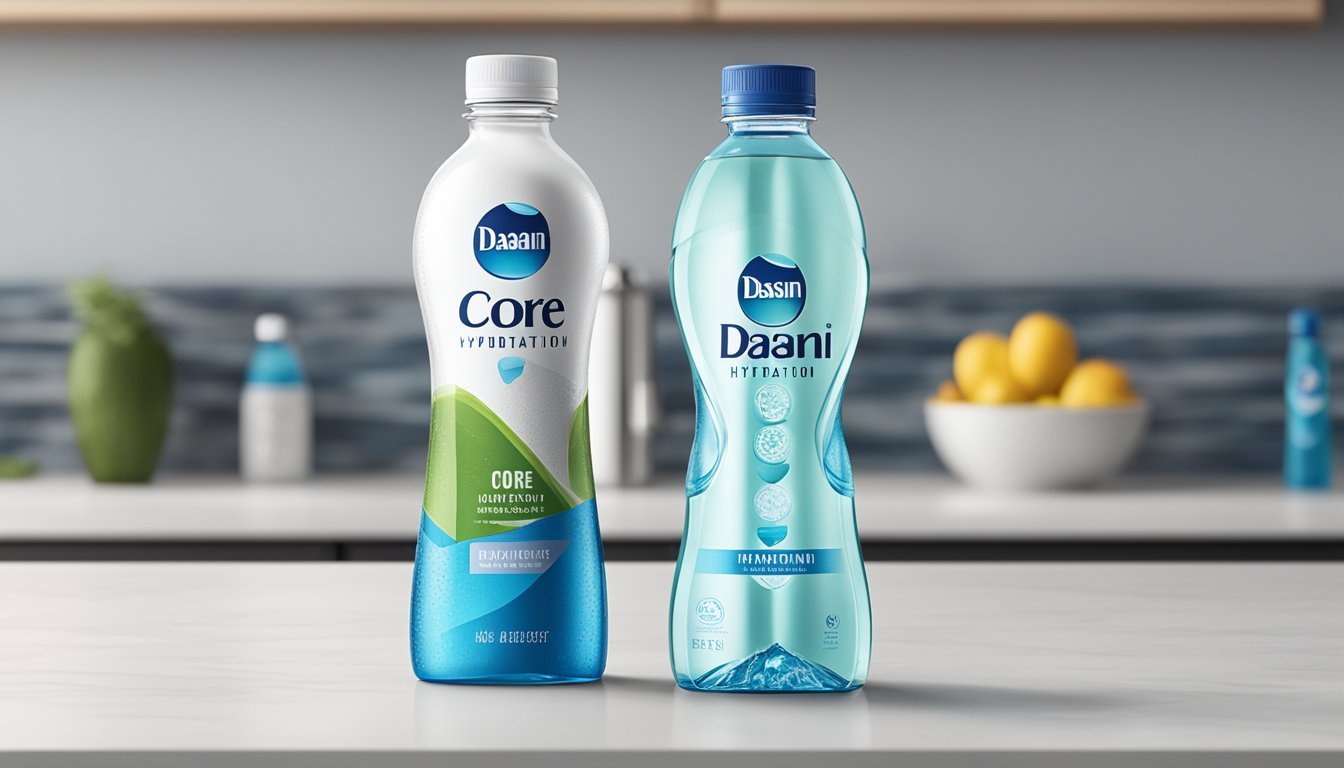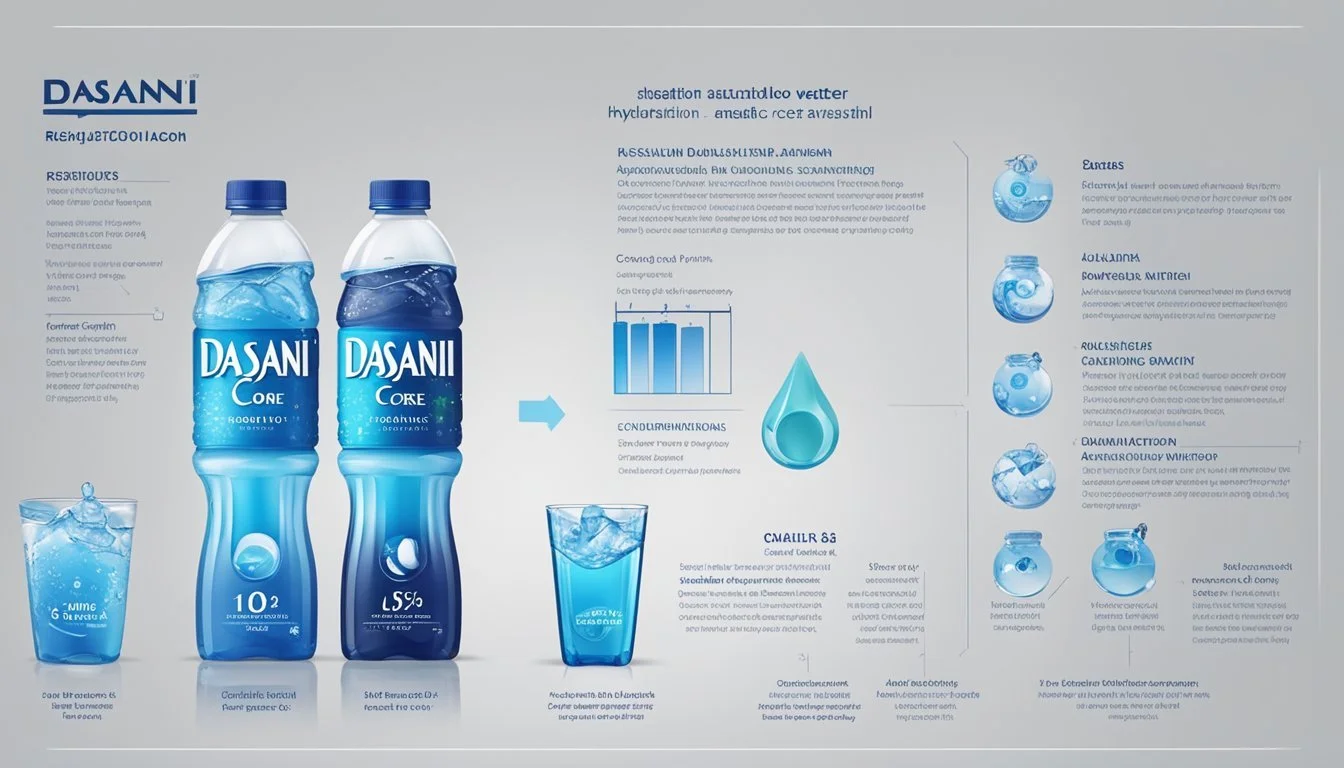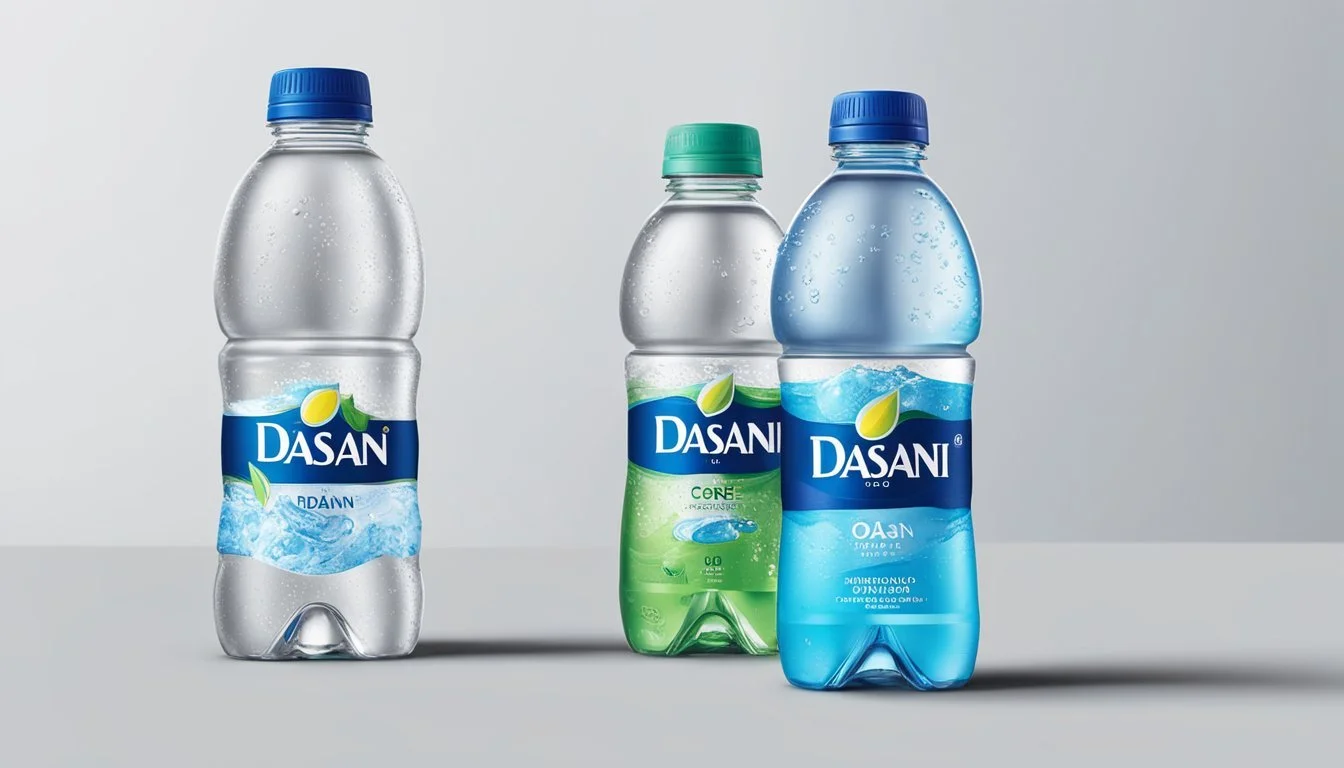Core Hydration vs. Dasani
Comparing Quality and Taste for the Best Choice
When it comes to staying hydrated, consumers are faced with an array of choices, especially in the bottled water market. Among these, Core Hydration and Dasani stand out as two noteworthy brands that cater to different preferences and claims. Core Hydration prides itself on having a perfectly balanced pH and the addition of electrolytes for taste, appealing to those who prioritize water that works in harmony with the body's natural pH. On the other hand, Dasani, a brand by the beverage giant Coca-Cola, distinguishes itself with a unique blend of minerals for taste, and it is one of the most widely available bottled water brands.
Debates surrounding the quality of bottled water often involve scrutinizing sources, purification processes, and additional ingredients like minerals and electrolytes. Core Hydration is designed for optimal hydration, using a multi-step purification process and boasting the inclusion of electrolytes without added flavors or sodium. This is in contrast to Dasani, which has faced criticism for the addition of ingredients like magnesium sulfate, potassium chloride, and salt, giving it a distinctive taste but also drawing skepticism from those who prefer their water to be unadulterated.
Choosing the right bottled water is a personal decision that can be influenced by factors such as taste preference, water source, purity, potential health benefits, and brand trust. While Core Hydration markets itself as a more 'healthy' and 'natural' alternative due to its pH balance and electrolytes, Dasani's widespread availability and taste might align better with those looking for convenience and familiarity. Consumers weigh these factors differently, hence determining which brand is better may not be a straightforward decision and is largely dependent on an individual's priorities and values when it comes to hydration.
The Significance of Hydration
Hydration is crucial for maintaining health and well-being. The human body consists of approximately 60 percent water, and every system depends on this vital substance. Efficient hydration is fundamental for several reasons:
Thermoregulation: Water helps to regulate body temperature through sweating and respiration.
Transportation: Essential for transporting nutrients and oxygen to cells, hydration ensures that the body functions efficiently.
Joint Lubrication: Adequate hydration keeps the joints lubricated, minimizing the risk of friction and discomfort.
The role of electrolytes such as sodium, potassium, calcium, and magnesium is intertwined with proper hydration. Electrolytes are minerals in body fluids that carry an electric charge and are essential for:
Muscle Function: They help with muscle contractions and relaxation.
Nerve Signaling: Electrolytes assist in nerve impulse transmission.
pH Balance: They help maintain the acid-base balance in the body.
When individuals consume water for hydration, the absorption and balance of these electrolytes are also essential. Different brands of bottled water, like CORE Hydration or Dasani, may contain different levels of electrolytes, which can affect hydration and general health. It's important for consumers to be aware of their water choice's electrolyte content to cater to their personal hydration needs effectively.
Comparative Analysis of Core Hydration and Dasani
This section provides a detailed comparative analysis of two well-known bottled water brands, Core Hydration and Dasani, focusing specifically on taste and flavor, mineral content, purification processes, and pH levels.
Water Taste and Flavor Profile
Core Hydration prides itself on a taste that is clean and crisp due to its ultrapurified quality. On the other hand, Dasani's taste is often noted as having a distinctive mineral flavor due to the added minerals for taste enhancement.
Comparative Mineral Content
Dasani incorporates minerals such as magnesium sulfate, potassium chloride, and salt to improve its water taste. In comparison, Core Hydration's water contains electrolytes for taste, added following the reverse osmosis purification process.
Purification Processes
Dasani employs a filtration method known as reverse osmosis to remove impurities from tap water, followed by the addition of minerals. Core Hydration also uses reverse osmosis in its purification process to ensure the removal of contaminants and particles.
PH Levels and Alkalinity
Core Hydration boasts a pH balance that matches the natural pH of the human body, typically in the range of 7.4, potentially adding to its hydrating effectiveness. Dasani's water, while purified, maintains a neutral pH level, aligning with the standard for most purified bottled waters.
Health and Safety Considerations
In evaluating bottled water, health and safety are paramount. Consumers should be aware of potential contamination with heavy metals, the use of chemical additives, and the presence of microplastics as they may impact water quality.
Contamination with Heavy Metals
Lead, mercury, cadmium, and arsenic are heavy metals that are dangerous even in small quantities. Bottled water, including brands like Dasani and Core Hydration, undergo testing to ensure levels are below the maximum contaminant levels set by regulatory agencies. However, instances of contamination can occur. Lead, specifically, is a toxic metal that can lead to serious health issues, and its presence in drinking water should be non-existent.
Additives and Chemical Compounds
Bottled waters can contain various additives. Dasani has been noted to contain levels of sodium and potentially other minerals for taste enhancement. Core Hydration promotes its product as balanced with electrolytes matching the body’s natural pH. Consumers should also consider the presence of fluoride and chlorine—common in tap water for dental health and disinfection—which may be found in some bottled waters.
Presence of Microplastics
The prevalence of microplastics in bottled water has gained attention. These tiny plastic particles can come from plastic bottles themselves or from environmental contamination. Studies suggest that microplastics may be found in many bottled waters, but the long-term health effects are still being researched. Both Dasani and Core Hydration are packaged in plastic, which could carry a risk of microplastic contamination.
Environmental Impact and Sustainability
When comparing Core Hydration and Dasani, one must consider the environmental aspects of bottle production and recycling, as well as the brands' overall carbon footprint.
Bottle Production and Recycling
Both Core Hydration and Dasani use plastic bottles, though their approaches to sustainability differ. Dasani has made efforts to improve its environmental impact by rolling out bottles made from 100% recycled PET plastic, excluding caps and labels. This initiative supports a circular economy for plastic packaging, a system aimed at eliminating waste through the continual use of resources. Despite these improvements, the global concern remains regarding the overall generation and disposal of plastic bottles.
Core Hydration, while also reliant on plastic bottles, markets its packaging as 100% recyclable. It is essential for consumers to have access to proper recycling facilities to ensure these bottles do not end up in landfills.
Carbon Footprint of Water Brands
The carbon footprint of any product, including bottled water from brands like Core Hydration and Dasani, is composed of several factors, such as manufacturing processes, transportation, and operational efficiencies. Water brands are increasingly evaluated on the basis of their environmental impact, with consumer expectations pushing for more sustainable practices.
Dasani has implemented measures to address its carbon footprint. In particular, the shift in packaging to 100% recycled PET plastic can contribute to a reduction in the brand's carbon footprint by minimizing the resources required to produce new bottles.
While specific data on Core Hydration's carbon footprint is not as widely publicized, like other water brands, it faces scrutiny regarding the sustainability of its production and distribution processes. Both brands continue to face the challenge of reducing their environmental impact in the manufacturing and distribution of their products.
Economic Factors and Consumer Cost
When comparing Core Hydration and Dasani bottled water, economic factors and consumer cost play a significant role in influencing buyers' choices. Core Hydration is typically priced higher than Dasani, reflective of its positioning as a premium water brand. Core's increased cost is attributed to its electrolyte-enhanced formula and the pH level that is optimized for human consumption.
Dasani, on the other hand, is a product of The Coca-Cola Company and is generally more affordable and widely available. Its cost-effectiveness is a crucial factor in its market penetration, allowing it to be conveniently found in a variety of retail locations from supermarkets to vending machines.
Brand Price Range (Typical Retail) Convenience Remarks Core Hydration Higher-end Selected stores Alkaline, with added electrolytes. Dasani Lower-end Wide distribution Accessible, with added minerals for taste.
Consumers often consider convenience when purchasing water. Despite a higher price point, some consumers prefer Core Hydration due to its added health benefits and brand image. The value associated with Dasani comes from its cost advantage and easy availability, making it an attractive option for budget-conscious consumers.
By understanding the cost and convenience associated with Core Hydration and Dasani, consumers can make informed decisions based on their personal preferences for hydration and economic considerations. Each brand caters to different segments of the bottled water market, with price and accessibility being key differentiators.
Brand Perception and Marketing Influence
The battle between Core Hydration and Dasani extends beyond the water itself, delving into the realms of brand perception and marketing influence. Each brand leverages unique strategies to maintain consumer loyalty and court expert endorsements, shaping public perception and sales.
Consumer Loyalty
Core Hydration capitalizes on its alignment with wellness and balanced pH levels to attract health-conscious consumers. It emphasizes the use of electrolytes for taste and a more "crisp" flavor profile. Dasani, under the Coca-Cola umbrella, relies on widespread distribution and availability, aiming to maintain its presence as a reliable and convenient option for hydration.
Strategies for Building Loyalty:
Core Hydration: Emphasizes health benefits
Dasani: Focuses on availability and reliability
Influence on Consumer Choices:
Core Hydration's target demographic often includes gym-goers and people who prefer a water that supports their active lifestyle.
Dasani remains a fixture in vending machines, supermarkets, and convenience stores, appealing to a broad spectrum of consumers.
Expert Testimonials and Endorsements
Experts in the water field, including water sommeliers, are occasionally tapped to lend their authority to bottled water brands. While Core Hydration and Dasani have not been the primary focus of these experts, their opinions can sway discerning customers.
Presence in Digital Media:
YouTube, as a platform rich with content creators, features reviews and taste tests that can influence brand perception. Videos comparing water bottle brands might not directly endorse one brand over another, but they can highlight subtle differences that resonate with viewers.
Value of Expert Opinion:
An expert's endorsement, whether it be from a water sommelier or a health authority, carries weight with segments of consumers seeking a more refined or health-oriented product.
In their marketing efforts, both Core Hydration and Dasani employ strategies to shape how consumers perceive their offerings and to encourage brand loyalty. Expert testimonials, whether through traditional endorsements or digital platforms like YouTube, can further influence consumer preferences within the bottled water market.
Regulatory Standards and Quality Assurance
When assessing the quality of bottled water brands like Core Hydration and Dasani, one must consider the regulatory standards and quality assurance measures that govern the bottled water industry. These include stringent oversight by federal agencies and verification through independent testing.
FDA and EPA Oversight
The Food and Drug Administration (FDA) regulates bottled water as a food product under the Federal Food, Drug, and Cosmetic Act (FFDCA), ensuring that it meets standardized safety and labeling requirements. The FDA's regulations encompass various aspects of bottled water, including its source, processing, and packaging. These federal standards are generally aligned with the Environmental Protection Agency's (EPA) guidelines for tap water, which indicates that consumers can expect a similar degree of safety from bottled water as they do from clean drinking water provided by their public water systems.
Contaminant Testing: Both Core Hydration and Dasani must comply with FDA limits on contaminants in bottled water. These contaminants can include chemical substances, microbes, and radiological components. It is crucial that bottled waters maintain contaminant levels well below the FDA's set Maximum Contaminant Levels to ensure water safety.
Third-Party Quality Tests
Independent quality tests conducted by third-party organizations can provide additional assurance regarding the purity and safety of bottled water products. While external testing is not mandated by the FDA or EPA, many companies voluntarily submit their products for such reviews to substantiate their quality claims.
Core Hydration markets itself on its purity, balanced pH, and the presence of electrolytes for taste. It may undergo third-party testing to validate these quality statements.
Dasani, produced by The Coca-Cola Company, also asserts a high level of quality control and may similarly participate in additional testing from independent labs.
Third-Party Certifications: Some bottled water brands also seek certifications from organizations like NSF International or the International Bottled Water Association (IBWA), which require their members to adhere to specific standards and undergo annual unannounced plant inspections, thus providing another layer of assurance to consumers about the bottled water's quality.
Comparative Market Analysis
When considering the market positioning of CORE Hydration and Dasani, both brands hold their own in a fiercely competitive bottled water industry. CORE Hydration, a newcomer relative to Dasani, has differentiated itself with an emphasis on pH-balanced water that purports to align with the body's natural pH level.
Dasani, on the other hand, is a well-established brand launched in 1999 and is backed by the beverage giant Coca-Cola. While Dasani has widespread distribution, it has faced challenges, particularly in 2020 when other brands were favored during panic buying phases of the pandemic.
In terms of market share and consumer reach, Dasani historically benefits from Coca-Cola's extensive distribution network. However, CORE Hydration has been gaining traction, particularly among health-conscious consumers seeking products with added benefits like electrolytes without added sodium or sweeteners.
The bottled water market, valued at over $300 billion in 2022, is expected to grow substantially. Both brands are navigating this expansion by playing to their strengths—CORE Hydration with health-focused marketing and Dasani with broad availability.
Business Insider, along with other market research outlets, often provide insight into the competitive landscape where these brands operate. Both brands are competing not just with each other but also with a plethora of other bottled water companies in a market that is increasingly crowded.
Here's a quick comparison table of key features:
Feature CORE Hydration Dasani pH Level Balanced Standard Added Electrolytes Yes No Brand Establishment Recent 1999 Parent Company Keurig Dr Pepper Coca-Cola Market Differentiation Health & Wellness Accessibility & Trust
Both brands are adapting their strategies to the evolving consumer preferences and regulatory environment concerning bottled water quality, environmental impact, and health implications.
Consumer Preferences and Habits
When it comes to bottled water, taste is a significant factor in consumer choice. Some drinkers prefer the pH-balanced and electrolyte-infused profile of CORE Hydration, finding it to taste pure and refreshing. In contrast, Dasani, a product of Coca-Cola, has received mixed reviews regarding taste, with some consumers detecting a distinct flavor due to added minerals.
Beverage consumption patterns reveal that buyers often opt for convenience, choosing bottled water for on-the-go hydration. However, a growing segment is turning towards filtered tap water, using home filtration systems to reduce plastic waste and avoid the costs associated with bottled beverages.
Whole Foods Market, known for its selection of healthier options, attracts shoppers who are mindful of the products they consume. Customers here may show a preference for brands like CORE Hydration, which aligns with the store's organic and natural ethos.
Consumers also base their preferences on:
Marketing Appeals: Imagery and brand messaging that align with lifestyle aspirations can sway buyers.
Environmental Impact: Those concerned with sustainability may prefer brands that emphasize eco-friendly packaging and practices.
Health Considerations: Water with added electrolytes or other health benefits can appeal to fitness-minded individuals.
Aspect CORE Hydration Dasani Taste pH-balanced, pure Mineral-infused flavor Environmental Initiatives Eco-friendly focus Varies by region Market Presence Available at Whole Foods Widely available Consumption Context Preferred for health benefits Chosen for convenience
These factors play a crucial role in steering consumer choices within the bottled water market.
Conclusion
When choosing between CORE Hydration and Dasani bottled water, consumers have distinct options. CORE Hydration prides itself on its balanced pH and electrolytes for taste, aiming to cater to those who prefer a water that closely mimics the body’s natural pH level.
Dasani, on the other hand, is known for its wide availability and consistent taste, but it may contain added minerals and a slightly different flavor profile that some consumers find less appealing.
Comparison Table:
Feature CORE Hydration Dasani pH Level Balanced pH Standard pH Electrolytes Added for taste Varies by region Taste Purified, with electrolytes for a clean taste Often described as having a distinct taste due to added minerals Availability Select stores Widely available
Customers are encouraged to consider their personal taste preferences, the importance of pH balance, and accessibility when making their choice. Each brand holds its own strengths and offers different benefits to the consumer.
In summary, those who prioritize a balanced pH and added electrolytes may lean towards CORE Hydration, while those who value broad accessibility and consistent mineral taste might prefer Dasani.







